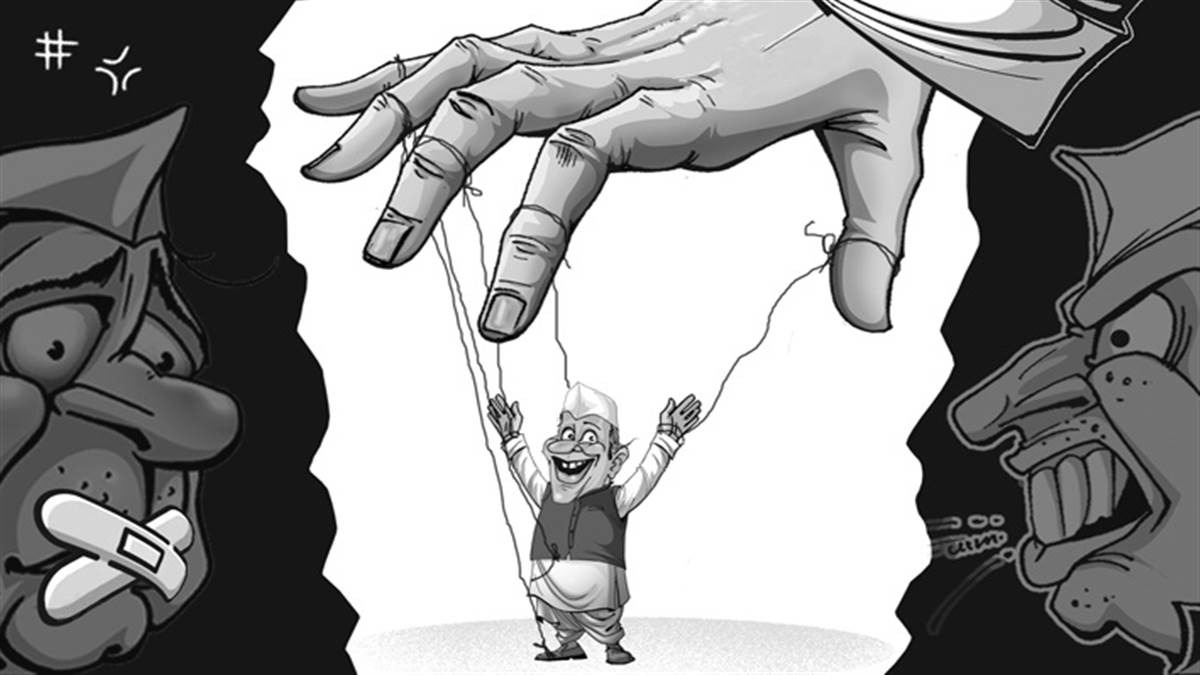In our country, usually the party leaders get angry at any statement made by an MP or MLA and reprimand them publicly. They warn them to speak according to the 'party line', whereas the leaders who condemn the expression of independent views by their party MPs, themselves make cheap, false and provocative statements to defame other parties. This is not only immoral but also suicidal from the point of view of national interest.
If the members of the highest think tank i.e. Parliament are unable to put forward their views, then it affects all other ideological, educational institutions and activities. After all, why should anyone else get the rights that an MP does not get? The arguments that the supremos of political parties give to shut the minds of their MPs are also suitable to stop writers, journalists, teachers etc. So what is the need for any research and evaluation on a problem that the Parliament does not even consider. The ruling parties control the educational institutions through grants and appointments. Therefore, there is no study or teaching on many topics like the killing of Kashmiri Hindus, migration, propaganda of communal conflict, organized religious conversion, Jihadi terrorism, various types of reservations etc. In a way, the related problems are completely ignored. The result of this behavior will not be good.
No article of the Constitution or any rule of Parliament deprives Members of Parliament of freedom of expression. Article 19 of the Constitution ensures the fundamental right of freedom of expression to all citizens. The supremos of political parties attack their MPs by depriving them of the basic human right. If something said by an MP is wrong, then showing proof of one's mistake is a more correct response. This will benefit everyone. Whereas censorship ultimately harms everyone. Depriving MPs of freedom of expression in public degrades the country in the eyes of the world, because it is an insult to its own Constitution and Parliament. It is a violation of the basic rights of citizens by an unconstitutional organization or political party. This affects the duty of Parliament. After all, if MPs cannot talk about what they are thinking, then what is the need for them? Then what is the benefit of Parliament? This harmful practice must end. This is not the case in any respectable democracy. In Britain or America, it is regularly seen that every member of Parliament freely expresses his views on any serious national or international issue. There is no interference from their party in that. Because political parties cannot impose any restrictions on the freedom of expression of opinion of MPs. MPs are primarily responsible towards the country and the people. There is no obstacle like 'party line' in their thinking or national policy making in the Parliament. Along with this, the party leaders also remain alert and active. In America, while being in the same party, senators not only openly express their opinion on every subject, but also challenge each other and fight openly to win referendum for themselves. Such freedom of MPs has strengthened the democracy of Britain and America. All aspects of an issue come to the fore only through the open presentation of different opinions. Only then is it possible to find a good solution.
It should be known that in communist countries, the practice of all MPs saying certain things on the instructions of the party has damaged their ideological, moral and political values. Open discussion on any difficulty was replaced by the stammering show-off of an MP. As a result, knowledgeable MPs were forced to silently accept false claims and policies. The entire public always remained in the dark. During the period of 1989-91, the world saw such amazing scenes in Soviet Russia and all the communist countries of Eastern Europe. Before this, there was never a real discussion on any subject in the parliament of these countries. Everything was a false assessment created by the top leaders of the parties, which was imposed on the policy-making and public of those countries. This caused irreparable damage to these countries. They are still suffering its ill effects. In comparison, there is a place for open discussion in the parliament in Europe and America. They are able to maintain research, evaluation, health policy and a dynamic system by freely expressing all kinds of ideas, suggestions and objections without any restriction. Thus, they are ahead of everyone in original thinking, writing and philosophical scientific research. Despite all the problems, the biggest means of creativity and self-confidence in European democracy is freedom, which does not stop anyone from speaking or criticizing. What will happen to a country where even the members of the supreme constituent assembly i.e. the Parliament do not have the freedom to express their views? This is a scary situation. Our constitutional guardians should pay attention to this.
The spirit and system of European-American democracy was kept in the constitution of independent India, but gradually the behavior of communist countries increased. This also had similar negative consequences. The history of our Parliament has seen shameless silence on serious issues like increasing monopoly of minorities, elimination of Hindus from Kashmir, similar trend in many other areas, increasing politicization of education sector, continuously migrating merit etc., because the political parties of the Parliament have unconstitutional, immoral control over the members. This pathetic situation is being hidden only because the leaders of all the parties are equally immersed in this selfishness. Therefore, none of our MPs proposed a discussion in Parliament on the persecution of Hindus in Bangladesh.
Since ideological censorship gives rise to all kinds of tyranny, social evils and vices, parliamentarians must be freed from party confinement in the field of discussion. Failure to do so may prove very harmful in the long run. This should be understood from the experience of communist countries.
 look news india
look news india

